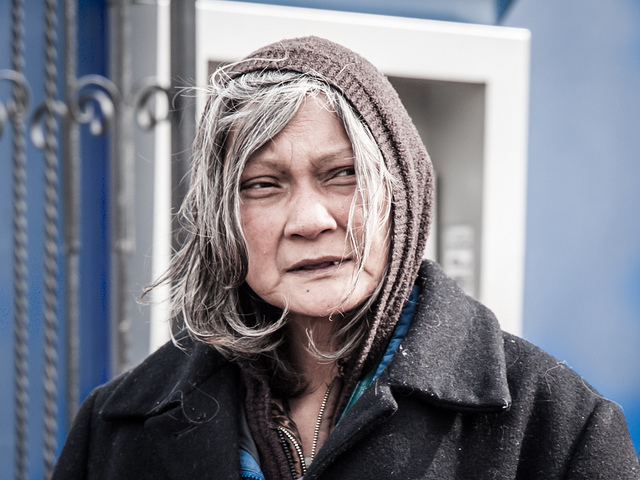
When I lived in the city, I passed a homeless woman each night I walked home from the subway stop.
She sat on the same street corner on the Upper East Side, quietly, never asking for anything. Some days she was knitting. Other days, she just watched the crowds go by.
One day, I was feeling lonely on my walk home. I’d seen this woman almost every day for the last year, but never really noticed her—until then.
That night, I stopped in the local bodega and bought her a sandwich. I handed it to her, and she smiled. Even though we didn’t exchange words, I felt like we had spoken.
All that time, I had been so busy in my own thoughts, my own life, that I didn’t give this woman a second thought—until I was feeling empty inside. I thought about that as I finished my walk home. Why is it that I so readily gave to charities, threw coins in the guitar cases of musicians on the subway and attended benefits, but didn’t give a thought to the homeless person I saw every day.
It wasn’t until I felt needy myself that I thought about being kind for no reason, just because.
That spirit of altruism—doing good just for the sake of doing good, without a reason or a special occasion—is a dying notion. We have special days to give thanks, events and fundraisers, but on the average day we are too caught up in our own lives.
That’s not to say we are all selfish, or greedy, but we are becoming so self-absorbed that we seldom give thought to anyone else until it suits us. We are trapped in our own little worlds, filled with our own concerns, and as long as everything is going okay, we rarely give others a second thought.
There is nothing wrong with that; we all need to take care of our own needs before we can help others, but I believe we, as Americans, have taken it to an extreme. We talk so much about self-care, self-promotion, self-esteem, self-advancement.
With so much focus on the self, it’s a wonder we’re not sick of ourselves.
But for the most part, it’s only when we feel not ourselves or out of sorts that we stop to notice and connect with those who share our pain.
Otherwise, like I did for all those days, we go about our daily business giving little thought to anything outside our own immediate world. And we wonder how we lose touch with reality.
Our ability to sympathize with those who fall on hard times is lacking—until those hard times hit us in the face.
I knew a woman, a coworker, who once responded, “that would never happen to me.” Her certainty frustrated me. How could she be so sure that she would never have something go wrong at the office? How could she be so cold?
I thought about my coworker the day I first noticed the homeless woman sitting at the street corner. I wondered, had I become like her, smug and so sure that bad times would never happen to me?
Perhaps in a way I had. I had forgotten how it felt to feel lonely, to be alone, and never gave it thought until it happened to me. Suddenly, the lady on the street was no longer just that homeless lady; she became an individual who was sad and fallen on hard times.
Suddenly, that lady was no different than me.
~
Relephant Read:
That Homeless Guy is my Uncle.
~
Author: Jane CoCo Cowles
Editor: Toby Israel
Image: Franco Folini/Flickr
~






Read 1 comment and reply